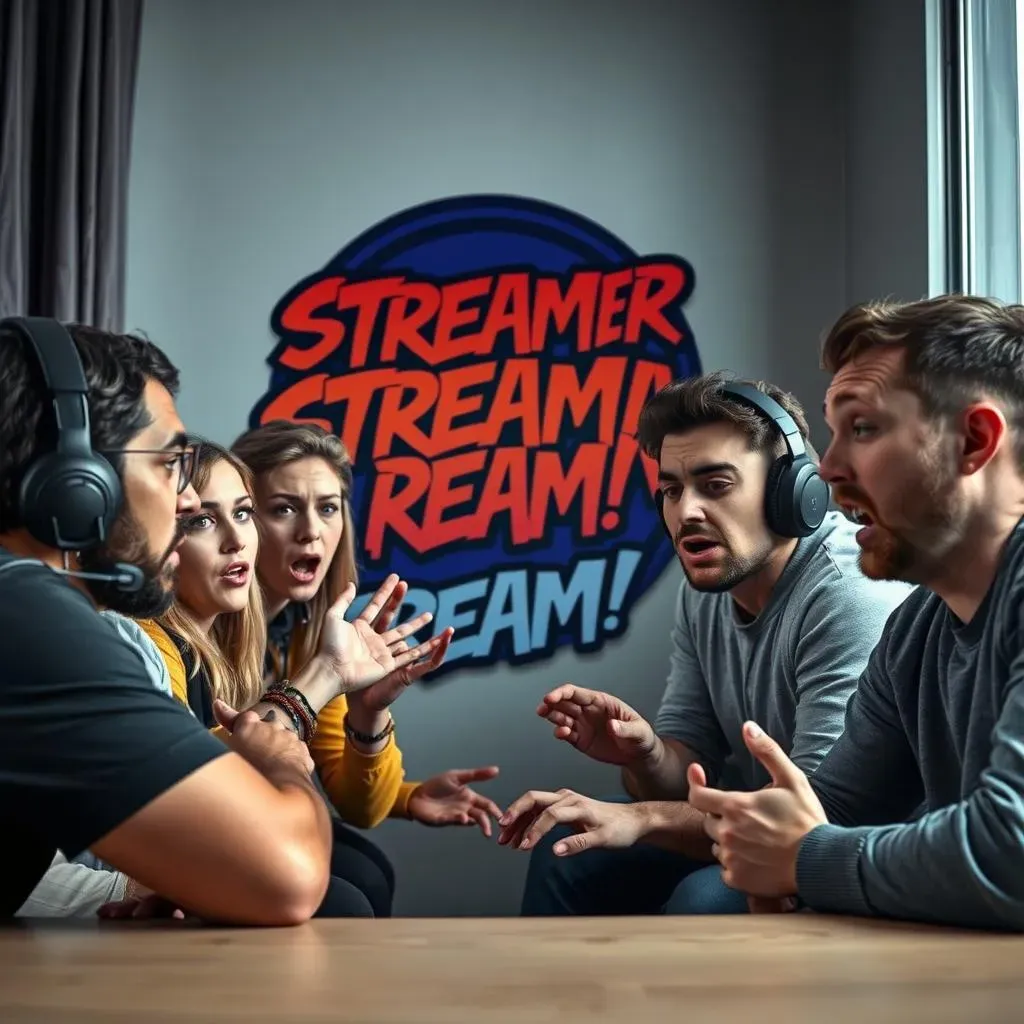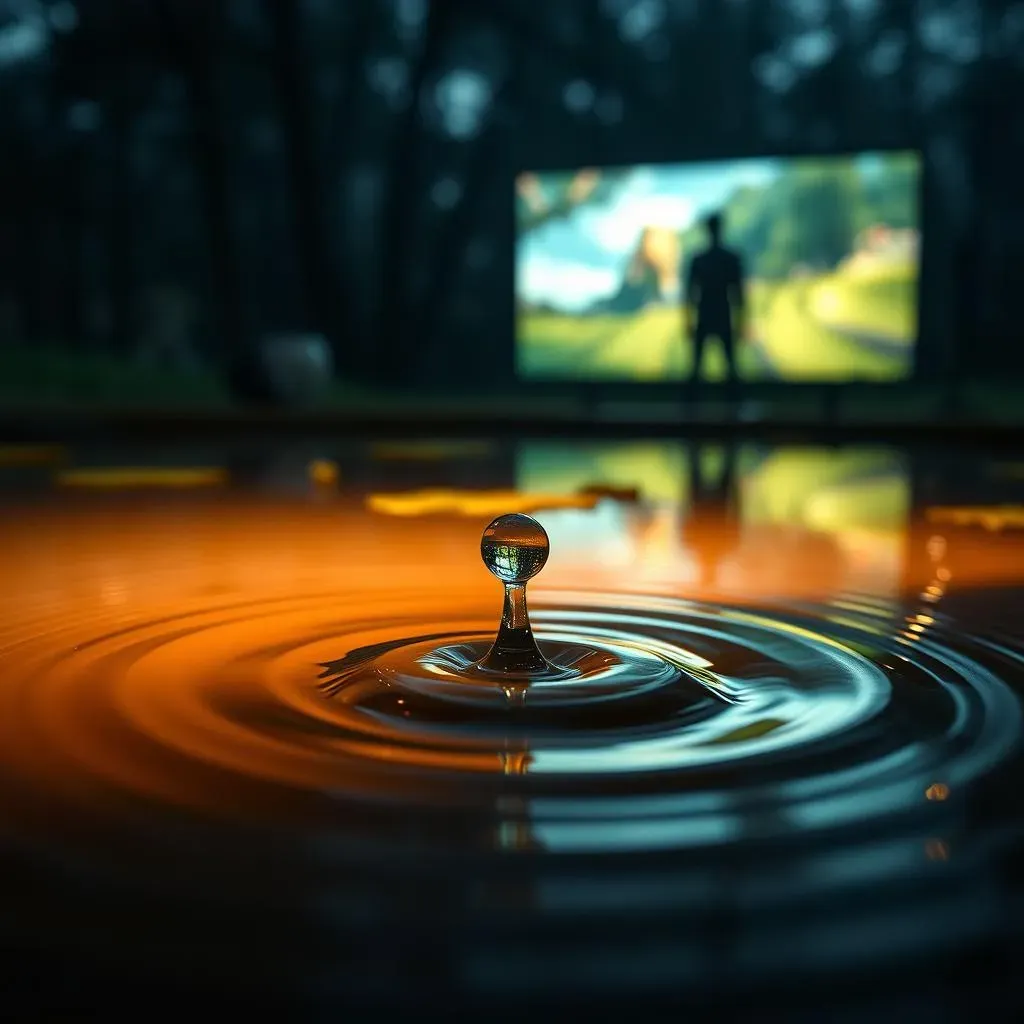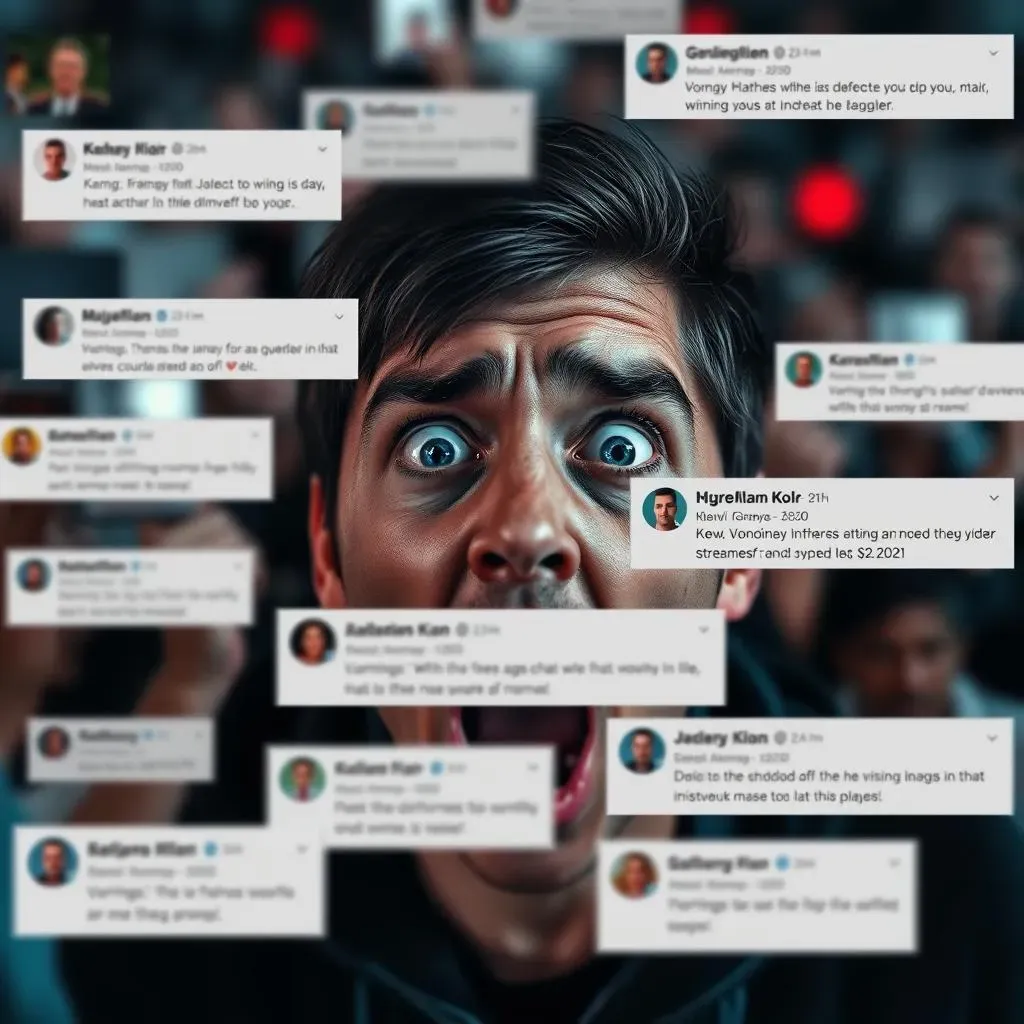Table of Contents
The world of online streaming is a captivating blend of entertainment, community, and, often, controversy. Millions tune in daily to watch their favorite personalities play games, chat, and create content. But behind the bright lights and engaging personalities lies a world of drama, ethical dilemmas, and public scrutiny. This article explores the fascinating and sometimes unsettling world of "famous streamers controversies." We'll examine high-profile incidents that have rocked the streaming community, from accusations of misconduct to platform bans and public feuds. We'll look at how social media amplifies these controversies, shaping public opinion and influencing the careers of these influential figures. We'll also analyze the impact of these controversies on the broader streaming ecosystem, considering the evolving ethical standards and the ongoing debate about accountability in the digital age. Prepare to dive deep into the complexities of fame, online culture, and the often-unpredictable consequences of actions in the public eye. Get ready to unravel the stories behind the headlines and understand the lasting effects of "famous streamers controversies."
Understanding Famous Streamers Controversies

Understanding Famous Streamers Controversies
Types of Controversies
Let's be honest, "famous streamers controversies" cover a wide spectrum. We're not just talking about minor disagreements; these are major incidents that often involve serious allegations. Think accusations of sexual harassment or assault, public spats involving hate speech or bigotry, or even legal battles over copyright infringement. Sometimes, it's about breaches of platform rules, leading to bans and lost income. Other times, it's about questionable behavior in their personal lives spilling into the public arena. The scale of these controversies is huge, with massive online communities weighing in and influencing how brands and platforms respond.
The impact on the streamer's career can be devastating. A single controversial moment can lead to a loss of sponsorships, a damaged reputation, and even a complete ban from the platform. The fallout isn't limited to the individual streamer either. These incidents can tarnish the reputation of the entire streaming community, making it harder for other creators to build trust with their audience. The speed and reach of online news and social media make it difficult for anyone involved to control the narrative.
Type of Controversy | Examples | Potential Consequences |
|---|---|---|
Sexual Misconduct Allegations | Accusations of harassment, assault, or inappropriate behavior. | Loss of sponsorships, platform bans, legal action. |
Hate Speech/Bigotry | Using offensive language or expressing discriminatory views. | Backlash from fans, loss of sponsors, platform penalties. |
Copyright Infringement | Using copyrighted music, game content, or other material without permission. | Legal action, DMCA takedowns, platform sanctions. |
Factors Contributing to Controversies
Several factors contribute to the prevalence of "famous streamers controversies." The intense pressure to constantly produce engaging content can lead to burnout and poor decision-making. The blurring of lines between online personas and real-life identities adds another layer of complexity. Streamers are constantly under scrutiny, and every action, even those intended to be private, can become public knowledge. The anonymity offered by the internet can embolden some individuals to engage in behaviors they wouldn't in real life. This creates a fertile ground for misunderstandings, escalating conflicts, and ultimately, full-blown controversies.
Furthermore, the often-intense competition within the streaming world can create a toxic environment. The drive for views, followers, and sponsorships can incentivize risky behavior. Some streamers might engage in "controversy baiting," deliberately creating conflict to attract attention, even if it means causing harm to others. The echo chambers created by online communities can further amplify negativity and fuel the flames of controversy, making it challenging to resolve conflicts peacefully or to foster constructive dialogue.
- Pressure to create constant content
- Blurring of online/offline identities
- Internet anonymity
- Intense competition
- Controversy baiting
- Online echo chambers
Analyzing the Impact of Famous Streamers Controversies

Analyzing the Impact of Famous Streamers Controversies
Ripple Effects: How Controversies Spread
So, we've talked about the *types* of controversies, but let's get into the *impact*. It's not just about the streamer themselves; these incidents create huge ripples. Think of it like dropping a pebble in a pond – the initial splash is the controversy itself, but the waves spread far and wide. Sponsorships vanish, deals are canceled, and the streamer's reputation takes a serious hit. But it doesn't stop there. The fallout affects the platform itself, potentially damaging its image and leading to changes in policies and community guidelines. It can even influence the behavior of other streamers, creating a climate of caution and self-censorship. The whole ecosystem feels the impact, from viewers to other creators and the platforms hosting them.
The speed at which news spreads online is mind-boggling. A single tweet or viral video can escalate a minor incident into a major crisis within hours. This rapid dissemination of information, often without proper context or verification, can lead to unfair judgments and reputational damage. The constant pressure to respond immediately to accusations or criticism, often in the face of a highly emotional and polarized online environment, further complicates the situation. It's a pressure cooker, and it's hard to see how things could be different in the current landscape.
Area of Impact | Specific Effects | Long-Term Consequences |
|---|---|---|
Streamer's Career | Loss of sponsorships, reduced viewership, platform bans. | Difficulty rebuilding trust, career stagnation or termination. |
Streaming Platform | Damage to reputation, increased scrutiny, policy changes. | Loss of users, decreased investor confidence. |
Streaming Community | Increased self-censorship, stricter community guidelines. | A less vibrant and creative environment. |
Financial and Legal Ramifications
Let's not forget the financial and legal aspects of these controversies. Losing sponsorships can mean a significant drop in income for streamers, sometimes leading to financial hardship. Legal battles, whether related to copyright infringement, defamation, or other issues, can be costly and time-consuming. These legal battles can also further damage a streamer’s reputation, even if they are ultimately successful in court. The stress and uncertainty associated with legal proceedings can be incredibly taxing, both emotionally and financially. It’s a high-stakes game with potentially severe consequences.
The legal ramifications extend beyond the streamer themselves. Platforms can face lawsuits if they are found to be negligent in addressing harmful content or behavior. Brands that sponsor streamers can also face backlash if they are associated with individuals involved in controversies. These legal and financial risks highlight the importance of proactive measures to prevent and manage controversies, including robust community guidelines, transparent reporting mechanisms, and effective crisis management strategies. It's a complex web of interconnected risks and responsibilities.
- Loss of sponsorship revenue
- Costly legal battles
- Reputational damage for brands
- Potential lawsuits against platforms
- Financial strain on streamers
The Role of Social Media in Famous Streamers Controversies

The Role of Social Media in Famous Streamers Controversies
Amplifying the Narrative: How Social Media Fuels Controversies
Social media plays a HUGE role in "famous streamers controversies." It's the wildfire that spreads the news, often faster than any traditional media outlet. A single controversial tweet, a leaked video, or a screenshot can go viral in minutes, reaching millions of people worldwide. This rapid spread of information, often unverified and taken out of context, can lead to a massive public outcry, shaping public perception and influencing how brands and platforms respond. The immediacy of social media means there's little time for nuance or clarification; accusations fly, judgments are made, and reputations are damaged in a whirlwind of online activity.
Think about how quickly a hashtag can trend, turning a minor incident into a major news story. Social media algorithms amplify trending topics, further exposing the controversy to a wider audience. This creates a feedback loop, where the more attention the controversy gets, the more it spreads. This makes it incredibly difficult to control the narrative or to present a balanced perspective. The speed and scale of this process can be overwhelming, leaving streamers and platforms scrambling to manage the fallout.
Social Media Platform | Role in Spreading Controversies | Impact on Streamers |
|---|---|---|
Rapid dissemination of news, trending hashtags, public debates. | Immediate exposure to criticism, potential for reputational damage. | |
YouTube | Viral videos, comment sections, community discussions. | Amplification of negative comments, potential for harassment. |
Twitch Chat | Real-time reactions, potential for toxic behavior, direct interaction with streamers. | Immediate feedback (positive or negative), vulnerability to online harassment. |
The Power of Online Communities: Shaping Public Opinion
Online communities play a powerful role in shaping public opinion during "famous streamers controversies." These communities can be incredibly supportive and loyal, rallying behind their favorite streamers and defending them against accusations. But they can also be highly critical and quick to judge, especially when fueled by anger or misinformation. The echo chambers created within these online spaces can amplify negative sentiment, making it difficult for dissenting voices to be heard or for constructive dialogue to occur. The polarization of these online communities can lead to intense online battles, further escalating the controversy and making it harder to find common ground.
This isn't just about casual observers; dedicated fan bases can become actively involved in defending or attacking streamers. They might organize campaigns, create petitions, or even engage in targeted harassment of those involved. This level of engagement highlights the intense emotional investment that viewers have in their favorite streamers and the powerful influence they can wield. Understanding the dynamics of these online communities is key to understanding how controversies unfold and how they ultimately impact the streamers themselves. It's a double-edged sword; intense loyalty can be a powerful force for good, but it can also be weaponized to cause significant harm.
- Fan communities can offer strong support.
- Online communities can amplify negative sentiments.
- Echo chambers limit diverse perspectives.
- Organized campaigns can influence outcomes.
- Online harassment is a significant concern.
Navigating the Digital Landscape: Strategies for Managing Controversies
Given the power of social media in shaping "famous streamers controversies," it's crucial for streamers and platforms to develop strategies for effectively managing these situations. This includes establishing clear community guidelines, implementing robust reporting mechanisms, and investing in crisis management teams. Quick, transparent communication is vital; addressing accusations promptly and directly can help mitigate the damage. However, it's also important to avoid fueling the fire by engaging in public arguments or responding to every single comment. A measured and thoughtful approach is often the most effective way to navigate these challenging situations.
Platforms also have a crucial role to play in managing controversies. They need to establish clear policies regarding harmful behavior, enforce those policies consistently, and provide support to streamers who are facing online harassment or abuse. Working with third-party organizations specializing in online safety and crisis management can provide valuable expertise and resources. Ultimately, a collaborative approach, involving streamers, platforms, and the online community, is essential for creating a safer and more responsible digital environment. It's a shared responsibility to cultivate a positive and productive online space for everyone.
Navigating the Future of Famous Streamers Controversies

Navigating the Future of Famous Streamers Controversies
Predicting the Future: Trends and Challenges
So, where do we go from here? Predicting the future of "famous streamers controversies" is tricky, but some trends are already emerging. We're likely to see increased scrutiny of streamer behavior, both from platforms and from viewers. Expect stricter guidelines, better reporting mechanisms, and potentially even more proactive intervention from platforms to address harmful content. The lines between personal and professional lives are likely to remain blurred, meaning streamers will continue to face challenges managing their public image and online persona. The constant pressure to generate engaging content will likely persist, creating an environment where mistakes happen and controversies arise. The role of AI and automation in content moderation will be crucial to watch; these technologies could play a significant role in identifying and addressing harmful content before it goes viral. However, AI also presents challenges; biases in algorithms could lead to unfair or inconsistent moderation.
We'll also see increased demand for accountability and transparency. Viewers are becoming more discerning and less tolerant of unethical or harmful behavior. This means streamers will need to be more mindful of their actions and more proactive in addressing criticism. The rise of alternative streaming platforms and communities could also shape the future of controversies. These platforms might have different community guidelines and enforcement mechanisms, leading to a more decentralized and potentially less regulated landscape. It's a complex picture, with no easy answers. But one thing's certain: the future of streaming will be shaped, in no small part, by how we address and learn from past controversies.
Trend | Potential Impact | Challenges |
|---|---|---|
Increased Scrutiny | Stricter guidelines, better moderation. | Balancing free speech with safety concerns. |
Demand for Accountability | Greater transparency, proactive measures. | Difficulty in enforcing standards consistently. |
Rise of Alternative Platforms | Decentralization, varied enforcement. | Potential for less regulation, increased risk. |
Promoting a Healthier Streaming Ecosystem
Ultimately, the goal should be to foster a healthier and more responsible streaming ecosystem. This requires a collaborative effort involving streamers, platforms, and viewers. Streamers need to prioritize ethical behavior, cultivate empathy, and engage in self-reflection. Platforms need to invest in robust content moderation systems, provide clear guidelines, and offer support to streamers facing challenges. Viewers need to be critical consumers of information, avoiding the spread of misinformation and holding streamers accountable for their actions. This requires a shift in culture, moving away from a focus on sensationalism and controversy towards a celebration of creativity, community, and ethical conduct.
Education and awareness are key to achieving this goal. Initiatives promoting digital literacy, media awareness, and responsible online behavior can help equip viewers with the skills they need to navigate the complex landscape of online streaming. Investing in research on the impact of online culture and developing effective strategies for preventing and managing controversies are also crucial. The future of streaming depends on our collective ability to create a space where creativity thrives and harm is minimized. It's a shared responsibility, and it requires a sustained commitment from everyone involved.
- Streamers should prioritize ethical behavior.
- Platforms need robust moderation and support systems.
- Viewers should be critical consumers of information.
- Education and awareness are crucial.
- Collaboration is key to a healthier ecosystem.